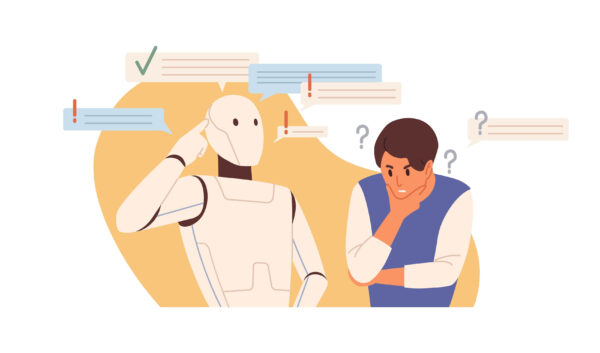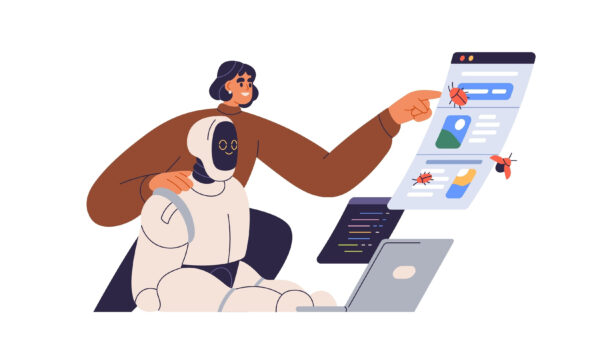Artificial intelligence (AI) technologies are on the rise and have already had a positive impact on work: They have reduced repetition and improved efficiency. Almost every sector across the globe is looking to leverage AI in some manner or has already implemented it into their business model. The benefits of AI for business are endless, from enabling a better understanding of customers’ preferences and requirements to increasing efficiency and productivity, helping CEOs and staff make better decisions, and curbing costs. It is also crucial that businesses implement AI to stay competitive in today’s fast-paced world.
According to research from Goldman Sachs, AI is expected to make 300 million jobs redundant over the coming years. It’s not all doom and gloom, though; AI could generate 97 million new positions. Despite the immense opportunities that will be created by AI, there may not be enough talent to fill these new roles.
We desperately need to address this skills gap, and there are several ways we can do that. One way to ensure that AI skills are adopted among future workers is to make AI a critical part of the information technology curriculum in schools. However, employers should also offer staff an opportunity to develop AI skills.
 Organizations must provide significant resources for upskilling their teams, and employees should take personal responsibility for their career development as AI expands and grows in numerous sectors, from entertainment to health care, in areas spanning natural language processing, deep learning, and robotic process automation.
Organizations must provide significant resources for upskilling their teams, and employees should take personal responsibility for their career development as AI expands and grows in numerous sectors, from entertainment to health care, in areas spanning natural language processing, deep learning, and robotic process automation.
The talent pool for these skills is currently limited—and, for that reason, in very high demand. This demand goes further than the IT department. The strongest demand for AI skills is coming from other business departments such as sales, finance, customer service, research, marketing, and business development.
Most of the current workforce remains unfamiliar with AI technologies. This is largely due to how new it is and how quickly it has grown, but also down to misconceptions and apprehensions. A portion of the workers who do not know much about AI likely are hesitant to learn due to fears surrounding losing their jobs to AI.
Misconceptions about AI must be addressed. We also need to broaden the pool of available talent by improving diversity in AI. This will result in better work because people with different perspectives and experiences are necessary to come up with diverse solutions. Promoting inclusivity will be key to addressing the skills gap and ensuring access to AI education for all demographics across the workforce. It is also important to note that we must work to eliminate any racial or gender biases in AI studies, as these act as limitations and barriers to employees embracing AI.
Addressing the AI gap is all about cultivating AI talent from the ground up, integrating AI into curriculums, and offering courses to employees in AI disciplines including neural networks, data science, and machine learning. Employers should also promote interdisciplinary studies whereby AI merges with other fields such as arts, biology, or social sciences.
Ultimately, to adequately address the AI skills gap, employees need real-world exposure to these technologies. Organizations can join forces with tech companies via partnerships for various projects and internships. They can also get their teams involved in AI-based hackathons and competitions.
Employers will play a significant role in this process as they will have to be the ones to invest in such training programs and have their teams undergo AI workshops and courses. Businesses can also forge partnerships with ed-tech platforms that are already providing these educational programs.
 Most of these platforms offer programs that can be completed remotely from anywhere in the world, increasing accessibility and promoting inclusivity at the highest level. It is crucial to remember that these steps may be daunting for employees and, for that reason, they should be recognized and rewarded for their efforts, as gaining these skills will greatly assist the companies they work for.
Most of these platforms offer programs that can be completed remotely from anywhere in the world, increasing accessibility and promoting inclusivity at the highest level. It is crucial to remember that these steps may be daunting for employees and, for that reason, they should be recognized and rewarded for their efforts, as gaining these skills will greatly assist the companies they work for.
As technology is constantly advancing and evolving, employees must remain up-to-date. This not only helps them better serve the business they currently work for but also gives them skills they can bring into their professional portfolio.
Another way employers can support the adoption of these essential skills is by evaluating the company’s tech stack and practices and adapting them to allow for reskilling among employees.
Self-paced learning can also play a vital role in driving the AI-reskilling revolution. Online platforms like Udemy, Coursera, and Khan Academy already offer high-quality AI courses. AI communities, forums, and hands-on projects can support employees in gaining essential AI skills. Ultimately, both employers and employees must adopt a continuous-learning mindset. employers and employees must prioritize frequently updating their skills and knowledge. AI
The tech landscape will always evolve—and the learning journey should evolve with it. Both can be transformative for just about any part of a business. For companies to tap into its transformative potential, they must help their employees become AI literate. The acceleration of this technology is inescapable, and the more businesses help their teams gain AI skills, the more opportunities they will have to harness its power. The bottom line is that improving AI skills is a win-win for both employers and employees.
Daniele Servadei is the CEO of Sellix, a universal payment experience that streamlines digital payments once and for all across cryptos and FIATs.













































